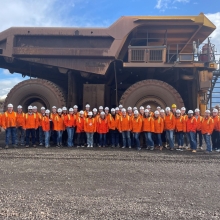Business leaders put real faces on issues
Greg Frandsen: ‘Taxes are really high in this state’

Minnesota employers perennially rank tax burden a top priority for the Legislature to address. Greg Frandsen, president of Industrial Netting in Brooklyn Park, joins the chorus.
“Taxes are really high in this state,” he says. They have an impact on him personally, on his company and on his employees.
Industrial Netting, founded in 1981, was purchased by Frandsen Corporation in 1999. The company serves a niche market of 4,000 active customers. It buys product by the truckload from the largest
netting producers, then generates pallet-size loads. It supplies netting and mesh components to the filtration industry as well as agriculture, safety, material handling and aquaculture markets.
“One of our mottos is that we want to be an easy place to do business,” Frandsen says. “Our brand promise is to custom convert and ship in 24 hours or less. We meet that commitment more than 96%
of the time.”
Industrial Netting is invested in Minnesota, Frandsensays, but that does not diminish his concern over taxes and other costs shouldered by employers and employees. He rattles off a few.
The state’s top individual income tax rate is fifth highest in the nation, affecting Frandsen’s ability to reinvest in his company. As an S Corp, business income flows through his personal taxes.
Electric rates continue to rise due to mandates forced on providers. Industrial Netting pays a large percentage of employee health insurance. “If that goes up, our costs go up.”
Workforce is a major reason why Industrial Netting is rooted in Minnesota. However, similar to many employers, Frandsen is challenged to find skilled workers. “We strive to find, develop and retain good workers, but turnover has been relatively high for us especially in entry-level positions,” Frandsen says, despite raising starting wages four times in the last three years.
High individual tax rates affect his ability to attract and keep top talent, too. “The more you tax and regulate talent, the less you get. With today’s technology, employees can be located almost anywhere in the country.”


